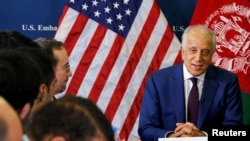The United States said Saturday that it was determined to address "legitimate concerns" of all sides in the conflict in Afghanistan to achieve peace.
Zalmay Khalilzad, U.S. special envoy for Afghan reconciliation, tweeted the pledge from neighboring Pakistan, where officials are trying to arrange and host the next round of talks with representatives of the Afghan Taliban.
The insurgent group has been reluctant to send its envoys to the dialogue since its last meeting with Khalilzad's team in the United Arab Emirates a month ago. Representatives from Pakistan, Saudi Arabia and the host country also attended that meeting.
The Taliban has since accused the U.S. team of backing away from holding discussions on key insurgent demands for all American and NATO troops to leave the country to allow Afghans to resolve political differences themselves.
Washington has been pushing the Taliban to open direct talks with the Afghan government, but insurgents have refused to do so, rejecting Kabul as an "American puppet."
"To achieve peace, we are ready to address legitimate concerns of all Afghan sides in a process that ensures Afghan independence and sovereignty, and accounts for legitimate interests of regional states," Khalilzad said.
He called for insurgents to agree to a cease-fire, and warned that U.S. troops would hit back if they came under attack from the Taliban.
"Urgent that fighting end. But pursuing peace still means we fight as needed," the U.S. envoy underscored in his messages via Twitter.
Pakistan promotes dialogue
Pakistan said it was trying to facilitate U.S.-Taliban discussions, hoping the dialogue would lead to an intra-Afghan peace process. Islamabad has long been accused of sheltering and covertly helping Taliban rebels orchestrate attacks inside Afghanistan. Pakistani leaders reject the charges.
"The solution to the Afghan issue is not possible without intra-Afghan dialogue, and Pakistan considers it vital for the restoration of peace in the entire region," Pakistani Foreign Minister Shah Mehmood Qureshi told local media Saturday.
Washington opened direct peace talks with the Taliban last summer to promote a political settlement to the war. Since then, media reports have said U.S. President Donald Trump is considering a plan to pull out nearly half of the 14,000 American troops stationed in Afghanistan in the coming weeks.
The reported plans have worried critics, who say the move will encourage the Taliban to continue its military campaign rather than negotiate a political settlement to the 17-year-old war.




